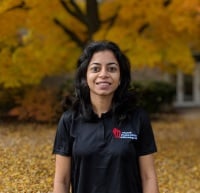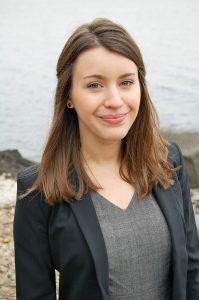The Virginia Horne Henry Wisconsin Distinguished Graduate Fellowship was established in 1998 by a bequest from the estate of Patrick Henry in honor of his wife, Virginia Horne Henry, a leader in the field of women’s physical education, including knowledge and appreciation of women’s movement, activity and the female body in culture. The primary purpose of the fund is to support and enhance the area of women’s engagement in physical activity.
Eligibility: The recipient must be a full-time graduate student in a doctoral program at the UW-Madison. Preference will be given to students in the School of Education. A major criterion for selection will be the potential research contribution of the candidate(s) to the area of women’s physical education, movement, activity and the female body in culture. Note: Employment of any kind through UW-Madison, including but not limited to graduate assistantships, paid internships, and other fellowships, may affect the fellowship award. There is a firm University policy of a limit of 133.33% on appointments for graduate students. These fellowships are considered to be 100% time.
Diversity is a source of strength, creativity, and innovation for UW-Madison. We value the contributions of each person and respect the profound ways their identity, culture, background, experience, status, abilities, and opinion enrich the university community. We commit ourselves to the pursuit of excellence in teaching, research, outreach, and diversity as inextricably linked goals. We encourage all qualified applicants to apply.
Application: Nominations may be from a department, a faculty member, or the candidates themselves. There is no limit on the number of students a department may nominate. The recipients will be selected by the Virginia Horne Henry Committee, appointed by the Dean of the School of Education.
Nominations must include the following as the application for fellowship:
- A statement of no more than two pages by the nominee, describing her/his academic or program interests, the relationship to the Virginia Horne Henry fund, and what the candidate would hope to accomplish during the year in which the fellowship would be held. Annual (12-month) awards may be possible. Please indicate your preference (9-month or 12-month) as part of your statement.
- The student’s transcript and curriculum vita.
- Two letters of faculty support, one of which must be from the student’s major professor. The letters may be uploaded with the rest of the application materials or emailed to stephanie.trigsted@wisc.edu. Applications must be received by February 4, 2022 by 4:30 p.m.
The Fellowship: The Virginia Horne Henry Wisconsin Distinguished Graduate Fellowship will be an academic year award. The rate for Wisconsin Distinguished Graduate Fellowships will be $23,727 for an academic year award (9-month award). In addition, the fellowship will pay tuition and fees.
Application questions may be directed to Stephanie Trigsted, stephanie.trigsted@wisc.edu or 608-262-8730. Questions regarding proposal content or the awards process may be directed to Jill Barnes, Chair of the Virginia Horne Henry Committee, School of Education, jnbarnes@wisc.edu or 608-262-1654.
Distinguished Graduate Spotlight
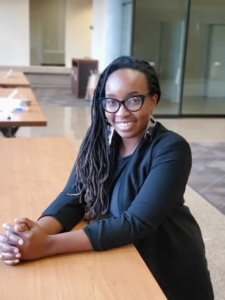
Kandyce Anderson Amie 2021-2022 Fellow
“I am a PhD student in Curriculum and Instruction. My research focuses on movement and dance in education spaces for K-12 students. The purpose of my research is to understand dance teachers and students’ experiences of the racial and gendered dynamic within the classroom. This research asks questions such as how is a female “Black body” trained and what emerges from that experience as a “Black body”, that seeks to subvert, resist, or comply under that training? My dissertation uses interdisciplinary theoretical frames of the body in physical education and curriculum to explore teachers and students’ lived experiences and perceptions of race and gender. These conditions regulate and discipline them as movers and learners in the dance space. My work as a dancer and qualitative researcher seeks to further understand the ways education responds to the Black female body in physical activity. My hopes are to bring further clarity to the realities of how race ideologies shaping the classroom.”
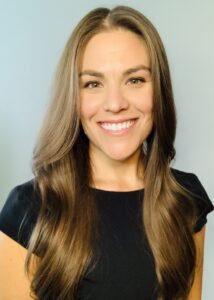
Bree Ann Romero 2021-2022 Fellow
“I am a doctoral candidate in the Department of History studying U.S. gender and women’s
history under the direction of Nan Enstad. My dissertation—Pursuing the Kingdom of God: Polynesian Saints, Popular Culture, and the Globalization of Corporate Mormonism—examines the history of Pacific Islanders who belonged to and labored for the Church of Jesus Christ of Latter-day Saints (LDS) since 1950, focusing on women performers at two Church-owned institutions on the island of O’ahu: the Church College of Hawai’i (now Brigham Young University-Hawai’i) and the Polynesian Cultural Center. Through my exploration of Pacific Islander women and ethnic dance in Hawai’i, my work demonstrates that their bodies, knowledge of movement, and physical activity catalyzed the popularity and economic success of the Polynesian Cultural Center, which was key to the growth of the LDS Church in the second half of the twentieth century. In so doing, my dissertation not only expands our understanding of the significance of women’s physical activity and diversifies dance history, but also disrupts conventional narratives of institutional growth.”
Previously Awarded
This is an accordion element with a series of buttons that open and close related content panels.
2020-2021 Fellows
Somya Rastogi 2020-2021 Fellow
“I am a third-year doctoral student studying Physical Activity Epidemiology in the Department of Kinesiology. Broadly, my research interest is in children and adolescents’ physical activity. In particular, I am interested in investigating the psychosocial effects of physical activity in the young populations. Under the mentorship of Dr. Cadmus Bertram, I am working on a research study that examines the effects of a virtual physical activity intervention on adolescents’ health related quality of life, physical self-perceptions, and self-esteem. It is known that the decline in self-esteem during adolescence is sharper in girls relative to boys. Therefore in addition to the total effects, we will also examine whether girls will benefit more from the intervention. We hope that the results of our study will guide future physical activity interventions that aim to improve children and adolescents’ psychosocial health. In future, I would like to investigate the effects of physical activity interventions among youth on less studied outcomes such as, depression, anxiety, and externalizing disorders.”
Morgan Sinnard 2020-2021 Fellow
“I am a doctoral candidate in Counseling Psychology working with Dr. Stephanie Budge in the Trans Counseling Advocacy Research and Education (Trans CARE) Lab. The Trans CARE Lab seeks to improve the quality of psychotherapy and healthcare for trans individuals and is a proud collaborator with the Wisconsin Transgender Health Coalition. My dissertation examines body objectification among trans individuals in a cisnormative society. The specific aims are to determine whether objectified body consciousness is a valid construct within this community, and to develop a reliable measure of this experience. I am enthusiastic about translating psychological theory into practical tools and interventions to promote the health and wellbeing of trans individuals. “
2019-2020 Fellows
Adam Corkery 2019-2020 Fellow
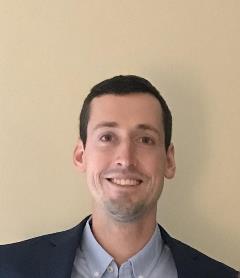 “I am a first year PhD student studying Exercise Physiology in the Department of Kinesiology. Under the guidance of my mentor, Dr. Jill Barnes, my research examines the influence of exercise on brain blood flow, with the intention of optimizing exercise interventions to prevent or delay the onset of cognitive decline and neurodegenerative disorders, such as Alzheimer’s disease. For my dissertation, I am examining the effects of single bouts of aerobic exercise on brain blood flow and blood vessel function to determine the ideal intensity and duration of exercise for brain health. Additionally, my research focuses on how variables such as biological sex and menstrual cycle phase may influence the ideal exercise prescription for brain blood flow. In the future, I plan to expand my research to include older populations, with a particular focus on post-menopausal women, as they are disproportionately affected by Alzheimer’s disease and other dementias.”
“I am a first year PhD student studying Exercise Physiology in the Department of Kinesiology. Under the guidance of my mentor, Dr. Jill Barnes, my research examines the influence of exercise on brain blood flow, with the intention of optimizing exercise interventions to prevent or delay the onset of cognitive decline and neurodegenerative disorders, such as Alzheimer’s disease. For my dissertation, I am examining the effects of single bouts of aerobic exercise on brain blood flow and blood vessel function to determine the ideal intensity and duration of exercise for brain health. Additionally, my research focuses on how variables such as biological sex and menstrual cycle phase may influence the ideal exercise prescription for brain blood flow. In the future, I plan to expand my research to include older populations, with a particular focus on post-menopausal women, as they are disproportionately affected by Alzheimer’s disease and other dementias.”
Daniel Schaefer 2019-2020 Fellow
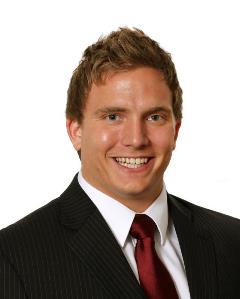 “I am fourth year doctoral student in the Wisconsin Injury in Sport Lab studying biomechanics under Dr. David. R. Bell. Prior to coming to UW – Madison, I was the Director of Strength and Conditioning at Florida State University where I utilized GPS and other technologies to reduce injury risk, create return to play strategies, and promote optimum athletic performance. While at Florida State, I worked with many female sports and found a disparity in the performance literature between males and females. That led me to pursue my PhD and my current research interests of athlete monitoring, recommendations for appropriate training volume, and if those differ for female athletes. Currently I am investigating jump analysis with GPS performance tracking to see if we can detect early signs of fatigue. If we can identify changes early on, then we can be more proactive in providing an athlete with individualized and appropriate training volume for the day. My goal with this line of research is to arm coaches with meaningful sport volume context allowing them to safely and effectively train their athletes. In turn, providing young female athletes the ability to peruse a longer and healthier career in physical activity and sport.”
“I am fourth year doctoral student in the Wisconsin Injury in Sport Lab studying biomechanics under Dr. David. R. Bell. Prior to coming to UW – Madison, I was the Director of Strength and Conditioning at Florida State University where I utilized GPS and other technologies to reduce injury risk, create return to play strategies, and promote optimum athletic performance. While at Florida State, I worked with many female sports and found a disparity in the performance literature between males and females. That led me to pursue my PhD and my current research interests of athlete monitoring, recommendations for appropriate training volume, and if those differ for female athletes. Currently I am investigating jump analysis with GPS performance tracking to see if we can detect early signs of fatigue. If we can identify changes early on, then we can be more proactive in providing an athlete with individualized and appropriate training volume for the day. My goal with this line of research is to arm coaches with meaningful sport volume context allowing them to safely and effectively train their athletes. In turn, providing young female athletes the ability to peruse a longer and healthier career in physical activity and sport.”
